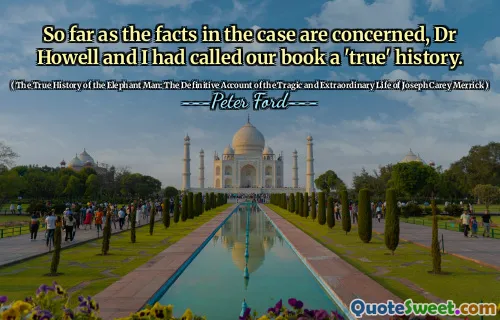
So far as the facts in the case are concerned, Dr Howell and I had called our book a 'true' history.
In this quote, the author emphasizes the commitment to factual accuracy in recounting the story, framing the book as a 'true' history. The use of the word "true" in quotation marks suggests an awareness of the complexities involved in capturing historical truth, especially in the context of a life as extraordinary and tragic as Joseph Carey Merrick's. It reminds us of the delicate balance historians must strike between objective facts and subjective interpretation. In the broader scope of historical writing, this statement invites readers to consider the importance of a truthful, rigorous approach while also being mindful that any history is ultimately a construction shaped by the authors' perspective, available evidence, and cultural context. For a story as poignant and intricate as Merrick's, this underlines the ethical responsibility held by the historians and biographers involved in portraying a person's lived experience, ensuring their narrative neither sensationalizes nor diminishes the human dignity of the subject. Engaging with this quote prompts reflection on our relationship with history and memory in general, urging a respectful and conscientious engagement with real lives behind records. As a reader, it encourages critical thinking on how histories are crafted and the role of empathy in understanding individuals from the past through the lenses historians provide.






